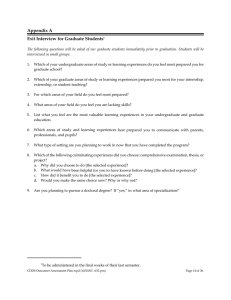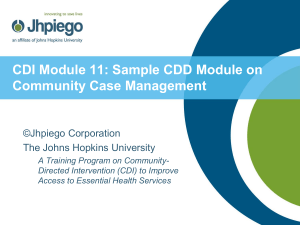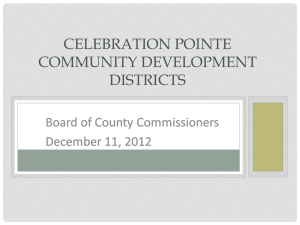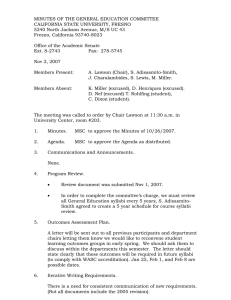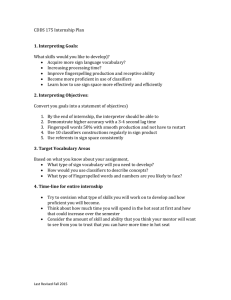MINUTES OF THE GRADUATE COMMITTEE CALIFORNIA STATE UNIVERSITY, FRESNO
advertisement
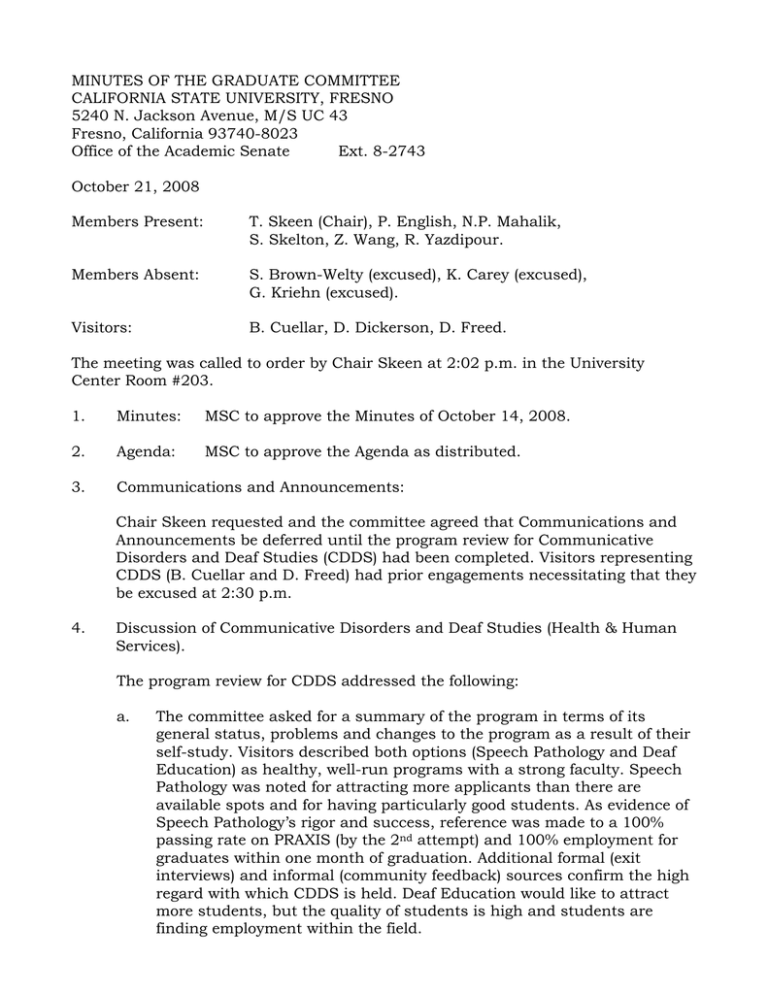
MINUTES OF THE GRADUATE COMMITTEE CALIFORNIA STATE UNIVERSITY, FRESNO 5240 N. Jackson Avenue, M/S UC 43 Fresno, California 93740-8023 Office of the Academic Senate Ext. 8-2743 October 21, 2008 Members Present: T. Skeen (Chair), P. English, N.P. Mahalik, S. Skelton, Z. Wang, R. Yazdipour. Members Absent: S. Brown-Welty (excused), K. Carey (excused), G. Kriehn (excused). Visitors: B. Cuellar, D. Dickerson, D. Freed. The meeting was called to order by Chair Skeen at 2:02 p.m. in the University Center Room #203. 1. Minutes: MSC to approve the Minutes of October 14, 2008. 2. Agenda: MSC to approve the Agenda as distributed. 3. Communications and Announcements: Chair Skeen requested and the committee agreed that Communications and Announcements be deferred until the program review for Communicative Disorders and Deaf Studies (CDDS) had been completed. Visitors representing CDDS (B. Cuellar and D. Freed) had prior engagements necessitating that they be excused at 2:30 p.m. 4. Discussion of Communicative Disorders and Deaf Studies (Health & Human Services). The program review for CDDS addressed the following: a. The committee asked for a summary of the program in terms of its general status, problems and changes to the program as a result of their self-study. Visitors described both options (Speech Pathology and Deaf Education) as healthy, well-run programs with a strong faculty. Speech Pathology was noted for attracting more applicants than there are available spots and for having particularly good students. As evidence of Speech Pathology’s rigor and success, reference was made to a 100% passing rate on PRAXIS (by the 2nd attempt) and 100% employment for graduates within one month of graduation. Additional formal (exit interviews) and informal (community feedback) sources confirm the high regard with which CDDS is held. Deaf Education would like to attract more students, but the quality of students is high and students are finding employment within the field. b. Clarification of the graduation rates found in the CDDS Review Statistics handout (distributed to the committee on Oct. 14, 2008) was requested. Data contained in the tables imply that only 126 of the 346 full-time students seeking a graduate degree since 2003 have graduated (36%). Visitors indicated that the table does not accurately reflect the five semesters it takes to complete the degree and the numbers are thus misleading. CDDS admits approximately 22-24 students per year and only 3-4 students fail to complete the program (usually for obtaining three Cs in coursework which disqualifies them from the program). c. Visitors were asked for their opinion regarding development of a Ph.D. program in audiology. CDDS is open to the possibility but, in consultation with the Provost and Dean Cuellar, several constraints (e.g., financial) make pursuit of the Ph.D. unlikely for now. d. A request was made of CDDS to separate the undergraduate and graduate Student Outcomes Assessment Plans (SOAP) to facilitate future reviews. Separating the SOAPs before the Planning and Implementation Meetings was suggested. CDDS agreed. e. There was discussion related to the scholarly activities, and specifically a decline in the number of publications, of the CDDS faculty. CDDS acknowledged that this is an area of concern that has been discussed within the department. CDDS considers themselves “o.k.” in this area but they reiterated their commitment to reverse the trend. A recent book publication and several articles in press or in preparation were cited as evidence of improvement. f. CDDS was asked to address the kinds of scholarly activities to which students were exposed during their academic careers. While only a few students elect to do a thesis, all students must produce graduate level research papers in their courses. All theses that have been completed have been presented at national conferences. There are currently no graduate students assisting faculty with research but Dean Cuellar has agreed to fund two graduate research assistantship positions next year. At 2:30 Dean Cuellar and D. Freed were excused from the meeting. g. A discussion of how CDDS has changed in response to the SOAP ensued. CDDS noted that several changes to the curriculum have been made. New course proposals are in the pipeline (e.g., in autism and communication) and several other courses (e.g., in advanced clinical methods) have been added that are designed to address new topics as they arise in the field. CDDS also solicits advice and feedback from an advisory board. Additionally, several specialty clinics have been introduced and preceptors who can directly assess student performance are used. A recommendation was made that CDDS obtain item analyses from national accreditation tests in order to identify problem areas. CDDS strongly agreed. 5. h. There was a discussion of the relationship between the undergraduate and graduate programs. The role of the undergraduate program is to prepare students for graduate work. There is currently little to no job market for students with an undergraduate degree in CDDS (an advanced degree is required for licensure). The State is formulating standards under which undergraduates may work as assistants under licensed supervision. CDDS is monitoring these developments closely. i. CDDS was asked to review its new facilities. CDDS described their new facilities as great and represent a tremendous improvement over what they had. Problems with one-way tinted windows in clinical observation rooms and inadequate heating in other rooms were noted. Requests to address the problems have been submitted but no corrective action has yet been taken. j. CDDS was asked to discuss the graduate writing requirement. The graduate level writing requirement is fulfilled in the CDDS research methods course where students are required to write research papers. The instructor of the research methods course is responsible for evaluating the papers and determining whether the student has met department requirements. CDDS was alerted to the problems that might arise with a single evaluator in the event of a student appeal. In addition, it was suggested that papers could be evaluated for graduate writing skill as opposed to evaluating their content for fulfilling specific course requirements. CDDS does not have the faculty to provide multiple evaluators. CDDS does provide a second evaluator if the student should request a review. This concluded the program review for CDDS. Communications and Announcements (continued). Dean Dickerson distributed a Proposal for the Certificate of Advanced Study for the Psychiatric Mental Health Nurse Practitioner within the Department of Nursing for future consideration. Chair Skeen suggested that the proposal be scheduled for review on Tuesday, Nov. 4. A new proposal from the Dept. of Child and Family Consumer Sciences is making its way toward the committee. S. Skelton notified the committee that when the CDDS program review comes to a vote that he will, as CDDS graduate coordinator, recuse himself from voting and that he will excuse himself from the committee’s deliberations. Future agendas were discussed. The following topics are tentatively scheduled: 10/28 - Decision on CDDS; preliminary discussion of Special Education. 11/04 - Proposal for the Certificate of Advanced Study for the Psychiatric 11/11 11/18 11/25 12/02 – – – – Mental Health Nurse Practitioner. Veteran’s Day (no meeting). Discussion of the Self-Study for Special Education. Thanksgiving (no meeting) Wrap-up committee business MSC to adjourn at 2:55 p.m. The next scheduled meeting of the Graduate Committee is Tuesday, October 28, 2008 at 2:00 p.m. in the University Center, Room #203. Agenda. 1. 2. 3. 4. 5. 6. Approval of the Minutes of 10/21/08. Approval of the Agenda. Communications and Announcements. Discuss Special Education (Program reps visit 11/18 at 2:20 p.m.) Discuss Certificate of Advanced Study Psychiatric Mental Health Nurse Practitioner. Discussion and decision regarding CDDS.
